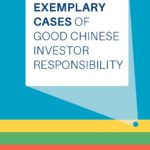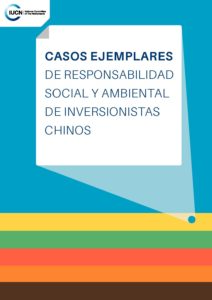Chinese Investments
Taking bad apples out of the basket
12 November 2018
A series of exemplary cases of good Chinese investor responsibility was published today. The series shines a new light on China, a country that is often criticized for failing to consider the harmful effects of their overseas investments. The five case studies provide guidance to local environmental and social activists on how to constructively engage with Chinese investors. They also aid Chinese authorities in improving the performance of their investments.
In the case studies, oil, coal and hydropower projects that faced opposition by locals were dropped by Chinese investors after thorough consideration of environmental and social impacts. In the cases, Chinese companies have been promoting transparency in oil governance, respecting local populations’ rights to say no to projects on their lands, such as indigenous populations in voluntary isolation and taken civil society input seriously and modified or even cancelled involvement with controversial projects. In all cases, the reputational risks of pushing controversial projects through were an evident factor in the decision to pull back.
Making positive cases the rule
IUCN National Committee of The Netherlands (IUCN NL) and the Leave it in the Ground Initiative (LINGO) have witnessed the impacts of Chinese overseas projects and decided to look at positive cases to strengthen responsible performance, rather than pointing a finger.
“These examples show how things should be done, and we are happy that this is not just theory, they have been done right by these Chinese companies. We want to contribute to making this the rule, rather than the exception”, says Liliana Jauregui (IUCN NL) whose organization funded the study. “China is often blamed for leading a ruthless race to the bottom, but they can choose a different path and even outperform other countries when it comes to respecting the environment and addressing social concerns.”
Hard-won rights by social pressure
“We can see both China at its best and potentially worst, in the cases we studied”, says Kjell Kühne (LINGO), main author of the study. “The positive outcome of these cases depended on courageous individuals within Chinese companies and institutions who were not afraid of taking the bad apples out of the basket. Momentarily it may look simply like a failed project, but in the end, everyone wins.“
Liliana Jauregui said: “Social and environmental standards are hard-won rights that social movements have been fighting to achieve with great sacrifice. Upholding those rights even when corrupt governments tell you otherwise means supporting the struggle for a more just world and a cleaner environment.”
Kühne: “The example of the Carmichael coal mine in Australia is highly relevant for global efforts to mitigate climate change. The Australian government pushed hard to get China to support this new mega mine which is completely at odds with the Paris Agreement. But China said no and it is likely that this mine will never be built.“
For investors and NGOs
The study comes in a context of increasing Chinese overseas investments, such as through the Belt and Road Initiative. The question of environmental and social impacts of this process has been asked time and again by foreign observers. Besides helping those Chinese institutions that strive to guide Chinese overseas investors towards routinely achieving an excellent environmental and social responsibility performance, the series also aims to encourage local groups to constructively engage Chinese investors with these best practice references in mind.
Download the case studies here:
Exemplary Cases of Good Chinese Investor Responsibility – Full Case Study Series
Transparency about no coal funding for Australian mega-mine – Case Study Carmichael Coal Mine, Australia
Respecting the lands of indigenous people in voluntary isolation – Case Study Oil Block 113, Peru
No dam imposed with violence against local opposition – Case Study Agua Zarca Hydropower Project, Honduras
Fostering transparency in the oil sector with EITI – Case Study Extractive Industries Transparency Initiative, Iraq
Taking civil society input seriously – Case Study Belinga Iron Ore Project, Gabon
Descarga los estudios de caso:
Casos Ejemplares de Responsabilidad Social y Ambiental de Inversionistas Chinos – Serie Completa
Mina de carbón Carmichael, Australia
Hidroeléctrica Agua Zarca, Honduras
Iniciativa de Transparencia en la Industria Extractiva (EITI), Irak
Proyecto de Mineral de Hierro Belinga, Gabón


